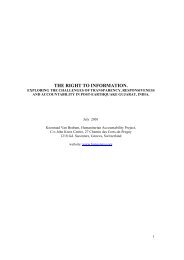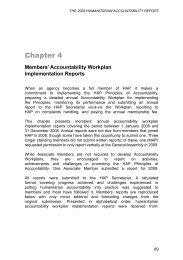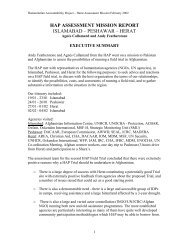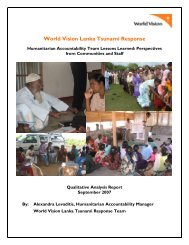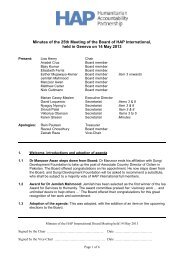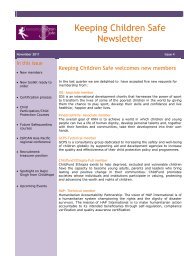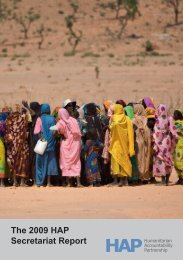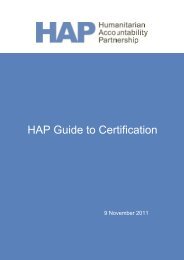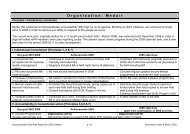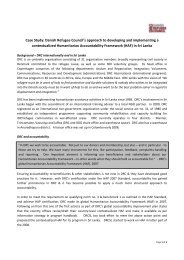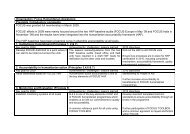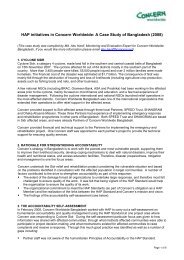DCA Humanitarian Accountability Framework - HAP International
DCA Humanitarian Accountability Framework - HAP International
DCA Humanitarian Accountability Framework - HAP International
Create successful ePaper yourself
Turn your PDF publications into a flip-book with our unique Google optimized e-Paper software.
Quality and <strong>Accountability</strong><br />
Commitments<br />
Commitments Authority Obligation<br />
<strong>HAP</strong> Standard<br />
<strong>HAP</strong> benchmarks<br />
B1-Hum Quality<br />
Management System<br />
(V &P)<br />
B2-Information (<strong>DCA</strong><br />
publicize info to<br />
beneficiaries/public)<br />
B3-Participation<br />
(Project beneficiaries<br />
take part in decision<br />
making in projects)<br />
B4-Staff Performance<br />
(<strong>DCA</strong> staff<br />
competencies re<br />
accountability<br />
measured and<br />
improved)<br />
B5-Complaints<br />
Mechanism (Safe,<br />
accessible means for<br />
complaints handling<br />
for beneficiaries of<br />
<strong>DCA</strong> projects)<br />
B6-Improvement<br />
(<strong>DCA</strong> process for<br />
continual improvement<br />
in humanitarian<br />
response. V&P)<br />
Head of<br />
Programme<br />
Development<br />
Unit /Relief<br />
Director<br />
Binding<br />
DanChurchAid <strong>Humanitarian</strong> <strong>Accountability</strong> <strong>Framework</strong><br />
Baseline analysis<br />
How do we make<br />
sure staff know?<br />
(Implementation<br />
mechanism)<br />
<strong>Humanitarian</strong><br />
<strong>Accountability</strong><br />
project<br />
description/workplan<br />
disseminated to<br />
<strong>DCA</strong> staff.<br />
Regular update from<br />
Relief Director on<br />
development of -<br />
and progress on<br />
<strong>HAP</strong> process<br />
Designated staff<br />
(<strong>HAP</strong> dream team at<br />
the core)<br />
continuously<br />
highlight in all<br />
relevant situations<br />
purpose and<br />
importance of <strong>HAP</strong><br />
Knowledge, Attitude<br />
and Practice (KAP)<br />
study<br />
How do we<br />
make sure<br />
partners<br />
know?<br />
(Partner status)<br />
ACT forum<br />
discussions<br />
Partner<br />
consultations<br />
Knowledge,<br />
Attitude and<br />
Practice (KAP)<br />
Assessment<br />
What has to be<br />
improved so we<br />
actually do what<br />
we say we are<br />
doing?<br />
(Compliance Status)<br />
Consistent<br />
reference to <strong>HAP</strong><br />
in relief<br />
assessment,<br />
monitoring and<br />
evaluation.<br />
Regional office<br />
understanding<br />
improved and<br />
<strong>HAP</strong> internalised<br />
into project and<br />
office management<br />
Project documents<br />
timely uploaded.<br />
Implementation Plan<br />
What do we<br />
want to achieve<br />
in a given<br />
amount of<br />
time?<br />
(SMART<br />
Objective)<br />
<strong>DCA</strong> staff<br />
improved own<br />
knowledge and<br />
interaction with<br />
<strong>DCA</strong> relief<br />
partners.<br />
<strong>HAP</strong> principles<br />
internalised in<br />
<strong>DCA</strong><br />
procedures.<br />
How do you<br />
measure that<br />
progress?<br />
(Progress Indicator)<br />
<strong>DCA</strong> internal QA<br />
procedures (relief<br />
PPM)<br />
Reviews and<br />
evaluations<br />
Observations from<br />
partner visits and<br />
field trips<br />
<strong>DCA</strong> project<br />
monitoring plan<br />
attached to<br />
Cooperation<br />
Agreement<br />
Action to be taken to reach goals.<br />
1.Communication of <strong>DCA</strong> process to improve<br />
accountability to beneficiaries (LIH: 2007-2010)<br />
2. <strong>HAP</strong> subsite developed on <strong>DCA</strong> Intranet<br />
3. <strong>HAP</strong> framework and statement available on<br />
<strong>DCA</strong> English and Danish website<br />
4.Regional representatives publicize <strong>DCA</strong><br />
commitment to accountability (RR: 2008)<br />
5. Dialogue with strategic relief partners on<br />
accountability theme (RR 2008-2010)<br />
6.<strong>DCA</strong> Partner assessment formats (RR/Relief<br />
officers 2008-2010)<br />
7. <strong>HAP</strong> theme at ACT for a meetings worldwide<br />
(relief officers)<br />
8.<strong>HAP</strong> self assessments (RR + office annually<br />
9.Pilot complaints mechanism piloted in<br />
Malawi/Angola (LSH//Jakob: 2008)<br />
10.Complaints mechanism implemented in 2<br />
more countries Ethiopia/Cambodia 2009)<br />
11. Complaints mechanism implemented in 2<br />
more countries (2010 Sudan/Congo)<br />
12..Non-Disclosure Policy (MEmil)<br />
13..Anti-Corruption Policy (PBL)<br />
14.Spot checks from HQ (PDU/RCU)<br />
15.Quarterly “real time” learning (RCU) exercise<br />
on accountability challenges.<br />
16.Upload all relevant documents on Intranet<br />
(Relief officers)<br />
17. Job descriptions (GK)<br />
18. Central web-based complaints mechanism for<br />
<strong>DCA</strong> staff, beneficiaries and partners<br />
(established 2008)




